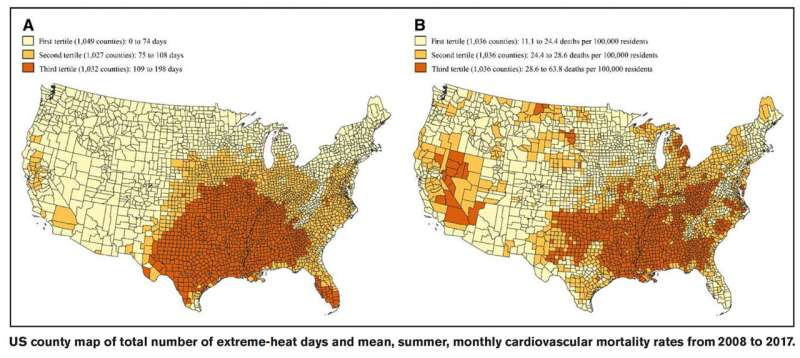
Two new University of Pennsylvania studies led by LDI Senior Fellow and Perelman School of Medicine cardiologist Sameed Khatana, MD, MPH are bringing a greater focus on the increasing health threat of extreme heat waves and the deadly connection between those weather events and cardiovascular mortality.
The two studies—one published in May in JAMA Network Open and the other published in June in the journal Circulation—were co-authored by LDI Executive Director Rachel M. Werner, MD, Ph.D., and LDI Director of Research Peter Groeneveld, MD, MS.
The first analysis intersected periods of extreme heat with records of adult deaths from all causes across the country’s 3,108 contiguous counties from 2008 to 2017. Previous research on extreme heat and mortality had focused on a limited number of urban areas. In this new work, the researchers found higher levels of all-cause mortality in those extreme heat periods with a greater increase in deaths among older adults, males, and Blacks.
The second study intersected periods of extreme heat in all counties with records of monthly cardiovascular deaths from 2008 to 2017. Researchers found extreme heat associated with an estimated 5,958 additional cardiovascular disease deaths in the counties during the period. The increase in deaths was greater among males compared to females, and greater for Blacks compared to whites.
Racial disparities
Both studies made the point that the extreme heat death rate disparities between whites and Blacks was likely to widen as the overall national incidence of both cardiovascular disease as well as climate-change-driven extreme heat continues to increase over the coming decades.
“The health impacts of extreme heat are under-appreciated by government agencies as well as health care providers,” Khatana said in an LDI interview. “Although there has been a growing realization that extreme heat can be detrimental to the health of individuals, many local governments still have no heat plans; and access to cooling centers, particularly for vulnerable individuals, is often lacking. Many areas, such as the Northeast, that in the past have not had much extreme heat are now experiencing these events with increasing frequency. Therefore, creating plans for how to get access to cooling for vulnerable individuals during extreme heat events is crucial.”
Khatana is an Assistant Professor in the Division of Cardiovascular Medicine at the Perelman School of Medicine and a physician at Philadelphia’s Corporal Michael J. Crescenz VA Medical Center. Werner is the Executive Director of the Leonard Davis Institute of Health Economics (LDI) and a Professor of both The Wharton School and the Perelman School. Groeneveld is Director of Research at LDI and Director of the Cardiovascular Outcomes, Quality and Evaluative Research Center at the Perelman School.
Extreme heat interferes with the body’s ability to cool itself, as blood vessels in the skin widen to allow more blood flow to dissipate heat from the body outward into the air. To achieve this, the body automatically redirects a portion of the blood that would normally be in major organs to the widened skin vessels, and accelerates the heart’s pumping to maintain adequate blood pressure. But in people with cardiovascular conditions, the heart is not able to meet this demand for more vigorous pumping.
Heat kills more people every year than any other kind of weather event, including hurricanes, tornadoes, and floods. The U.S. Environmental Protection Agency cites 1,300 deaths per year according to death certificates, but notes “extreme heat contributes to far more deaths than the official death certificates might suggest.”
This is also true in the case of cardiovascular-related heat deaths because extreme heat affects the heart in ways that sometimes don’t manifest as health emergencies until days later—and case records don’t reflect the connection.
Both heat and cardiovascular disease increasing
The population-wide incidence of cardiovascular disease in general and cardiovascular-related extreme heat deaths are steadily increasing at the same time climate change is driving more heat waves, with higher temperatures covering wider areas of the country.
The extreme heat wave that swept across western states last summer set new records and was characterized as a “1,000-year” event by the World Weather Attribution initiative, a collaboration of climate scientists around the world. But this June, some of those same records were broken by even hotter temperatures in a heat wave gripping southwestern and central states where cities logged temperatures as high as 114 degrees for extended periods.
Source: Read Full Article